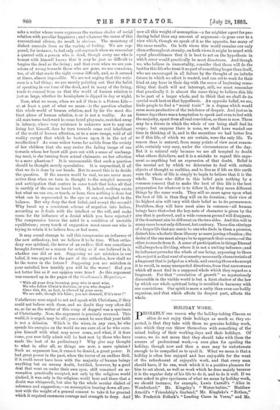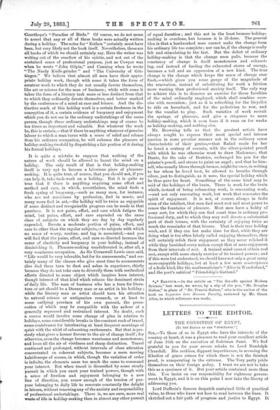HOLIDAY WORK.
pROBABLY one reason why the holiday-taking Classes so often do not enjoy their holidays as much as they ex- pected, is that they take with them no genuine holiday work, into which they can throw themselves with something of the mixed feeling of their working-days and their holidays. Of course, we do not mean that they should take with them the arrears of professional work,—a sine plan for spoiling the holiday, though now and then a man may be unfortunate enough to be compelled so to spoil it. What we mean is that a holiday is often less enjoyed and less enjoyable for the want of the refreshment of enjoyable work, and that every man should have, if he can, work which it is a positive pleasure for him to set about, as well as work which he does mainly because it is the regular duty of his life to do it, and to do it well. If we were asked to give specimens of what we mean by holiday work, we should instance, for example, Lewis Carroll's "Alice in Wonderland," Mr. Kingsley's "Water-babies," Matthew Arnold's "Friendship's Garland," Mr. Kinglake's " Eothen," Mr. Frederick Pollock's "Leading Cases in Verse," and Mr.
Courthope's "Paradise of Birds." Of course, we do not mean to assert that any or all of these books were actually written during a holiday. The notes for" Eothen "certainly must have been, but very likely not the book itself. Nevertheless, these are all books of which we should certainly say, Here the writer was writing out of the overflow of his spirits, and not out of the sustained sense of professional purpose, just as Cowper was when he wrote "John Gilpin," and Canning when he wrote "The Needy Knife-grinder" and "The University of Got- tingen." We believe that almost all men have their appro- priate holiday work, though with some it takes the form of amateur work to which they do not usually devote themselves, like art or science for the man of business ; while with some it takes the form of a literary task more or less distinct from that to which they ordinarily devote themselves, and better marked by the exuberance of a mind at ease and leisure. And the dis- tinctive mark of this holiday work is a certain freshness in the conception of it, a certain evidence of buoyancy and enjoyment which you do not see in the ordinary undertakings of the same person, though these ordinary undertakings may of course be ten times as itnportant and valuable. But whatever the work be, this is certain,—that if there be anything whatever of genuine labour to which a man turns with a sense of relief and release from his ordinary occupation, he will enhance the pleasure of holiday-making twofold by dispatching a fair portion of it during his formal holidays.
It is quite a mistake to suppose that nothing of the nature of work should be allowed to haunt the mind on a 'holiday. The only result of that is that holiday-making itself is very apt to become a laborious piece of pleasure- 'seeking. It is quite true, of course, that you should not, if you -can help it, take task-work on a holiday. But it is quite as true that if there is anything requiring some effort and method and care, in which, nevertheless, the mind finds a fresh spring of buoyancy,—such as many men, for instance, who are not musicians by profession, find in music, and many more find in art,—the holiday will be twice as enjoyable if some distinct and recognisable progress can be made in that province. It is not pains, effort, and care which fatigue the mind, but pains, effort, and care expended on the same class of subjects on which they are day by day regularly -expended. Devote a moderate portion of pains, effort, and care to other than the regular subjects,—to subjects with which szo sense of worry, routine, and fag is associated,—and you will find that the pains, effort, and care so directed increase the sense of elasticity and buoyancy in your holiday, instead of diminishing it. Pleasure-seeking unadulterated is, after all, a very wearisome occupation. As Sir Cornewall Lewis once said, "Life would be very tolerable, but for its amusements," and cer- tainly many of the classes who give most time to amusements also find them turn to dust and ashes in experience, chiefly because they do not take care to diversify them with methodical efforts directed to some object which inspires keen interest, though interest of that kind which relaxes the dominant strain of daily life. The man of business who has a turn for litera- ture or art should be a literary man or an artist in his holiday ; while the literary man or artist should turn his attention
natural science or antiquarian research, or at least to some outlying province of his own pursuit, the prose- cution of which may be compatible with the ardour of a generally repressed and restrained interest. No doubt, such a course would involve some change of plan in relation to holidays, some considerable breaks in the constant rush of travel, -some contrivance for interleaving at least frequent mornings of .quiet with the whirl of exhausting excitements. But that is pre- cisely what gives a keener flavour to the air of change itself; for otherwise, even the change becomes wearisome and monotonous, and loses all the air of vividness and sharp distinction. Travel continued and prolonged, without intervals of close attention concentrated on coherent subjects, becomes a mere moving kaleidoscope of scenes, in which, though the variation of order is infinite, the elements seem too much the same to command your interest. But when travel is diversified by some steady pursuit in which you exert your trained powers, though with a sense of freedom and enjoyment belonging to a new line of direction, you renew enough of the tension of pur- pose belonging to daily life to renovate constantly the delight in leisure, without renewing any of the anxiety and responsibility of professional undertakings. There is, we are sure, more real waste of life in holiday-making than in almost any other pursuit
of equal duration ; and this not in the least because holiday- making is overdone, but because it is ill-done. The general idea is that a hardworked man cannot make the change from his ordinary life too complete ; nor can he, if the change is really felt and stimulating to the last. But the defect of ordinary holiday-making is that the change soon palls, because the constancy of change is itself monotonous and exhaust- ing, and instead of feeding the exhausted stores of energy, becomes a toil and an oppression of a new kind. The true change is the change which keeps the sense of change ever fresh,—which gives you some gauge of the magnitude of the renovation, instead of substituting for work a friction more wasting than professional anxiety itself. The only way to achieve this is to discover an exercise for those faculties of the mind ordinarily employed, which shall combine exer- cise with recreation; just as it is refreshing for the bicyclist to ride on horseback, and, for the pedestrian to row, and for the vocalist to play. Such varieties of work recruit the springs of pleasure, and give a crispness to mere holiday-making, which it soon loses if it runs on for weeks as holiday-making, and nothing else.
Mr. Browning tells us that the greatest artists have always sought to express their most special and intense passion in some peculiar manner not in the ordinary sense characteristic of their genius,—that Rafael made for her he loved a century of sonnets, with the silver-pointed pencil with which he was otherwise wont to draw Madonnas; that Dante, for the sake of Beatrice, exchanged his pen for the painter's pencil, and strove to paint an angel ; and that lie him- self, who usually blows through bronze, might for once, in writing to her whom he loved best, be allowed to breathe through silver, just to distinguish, as it were, the special holiday which he thus gave his heart. Somethiug of the same kind may be said of the holidays of the brain. There is work for the brain which, instead of being exhausting work, is renovating work, —and not only renovating work, but work that renovates the spirit of enjoyment. It is not, of course, always in frolic even of the intellect, that men find most rest and most power to renew the fountains of pleasure. Most men have a hobby of some sort, for which they can find scant time in ordinary pro- fessional duty, and to which they may well devote a substantial part of their leisure, with the certainty of enjoying twice as much the remainder of that leisure. That is their true holiday work, and if they can but make time for that, while they are doing what is too often falsely called enjoying themselves, they will certainly relish their enjoyment as they never relished it while they banished every notion except that of mere enjoyment from their intervals of rest. A trained mind cauuot obtain real rest, except with some steady exercise of its trained powers; and if this were but understood, we should have not only a great many more enjoyable holidays, but at least a few more masterpieces of a frolic kind, like the mathematician's "Alice in Wonderland," and the poet's satirical "Friendship's Garland."



































 Previous page
Previous page